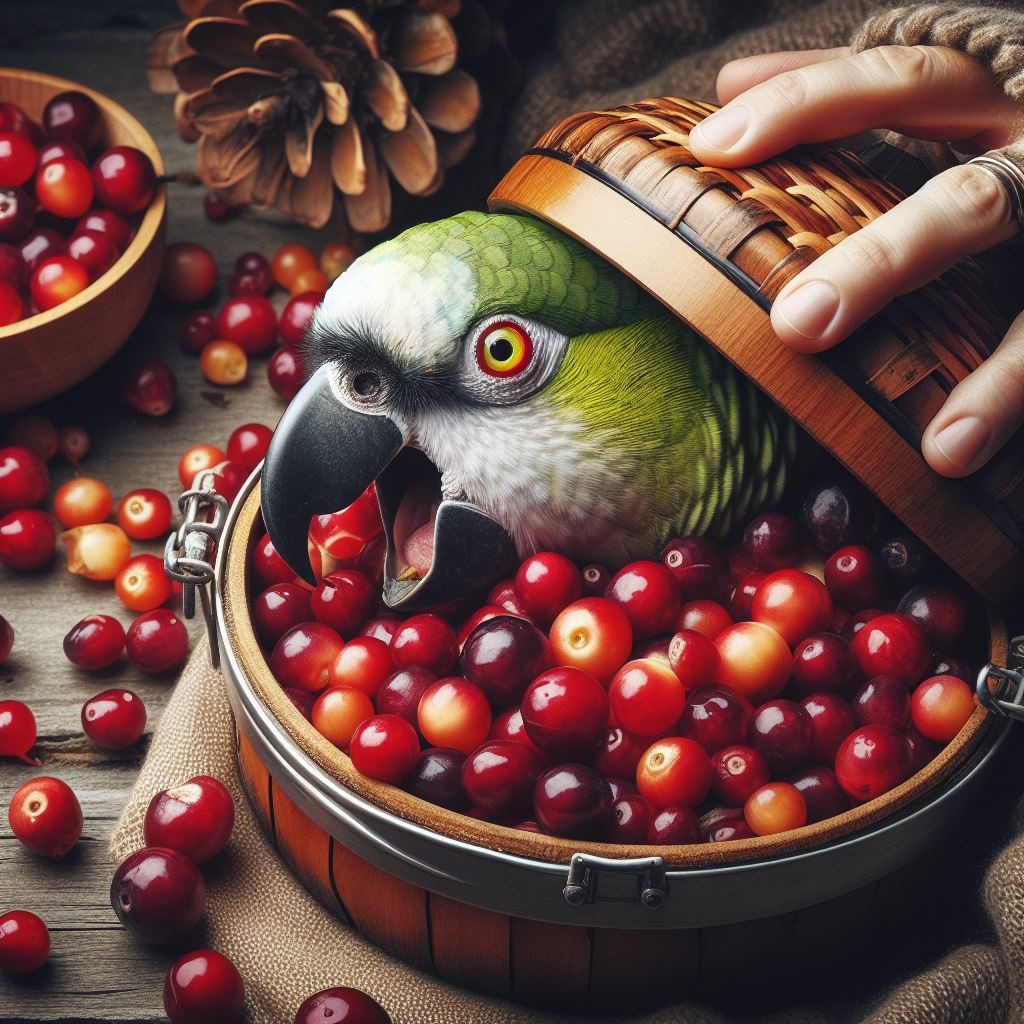Cranberries aren’t my favorite kind of berry, I love every other kind but cranberries just don’t agree with my taste buds. I think it’s due to how bitter and sour they are. However just because I don’t like them doesn’t mean that my parrot can’t enjoy them.
I’m aware berries are an excellent source of nutrition for parrots so I’ve started adding more into his diet. We know every other kind of berry is safe for our parrots like strawberries and raspberries, but what about cranberries?

Can parrots eat cranberries? Yes, parrots can eat cranberries. They are a completely safe fruit for parrots to have and contain vital nutrients, minerals, and antioxidants that birds will benefit from. These things include vitamins A, C, E, and K, along with manganese, potassium, and copper.
In this article, I’m going to further highlight the benefits in detail along with other things you should know before you feed cranberries to your feathered friend.
What Benefits Do Cranberries Have?
A cup of raw cranberries contains:
| Calories | 46 |
| Protein | 1g |
| Sugar | 4g |
| Fiber | 4g |
| Carbohydrates | 12g |
| Fat | 0g |
Vitamin A
Cranberries contain a healthy amount of vitamin A, a fat-soluble vitamin that has many advantages your parrot can enjoy like :
- Improved eyesight
- Antioxidant properties to reduce the risk of cancers
- Supports a healthy immune system
- Improved bone health
Vitamin A deficiency is quite common in birds so your bird must get enough of it. Foods like green leafy vegetables and fruits like carrots, mangoes, peppers, parsley, and cantaloupe are all great sources of vitamin A.
Vitamin C
Vitamin C is one of the main sources of antioxidants found in cranberries. It’s also important for the maintenance of your parrot’s skin, bones, and muscles. Other benefits of vitamin C include :
- A healthier immune system
- Lowered chance of dangerous diseases like cancer
- Anti-inflammatory properties
- Helpful for washing heavy metals out of the system
- Cleans plaque from blood vessels and helps lower cholesterol
Vitamin K
Vitamin K is also present in cranberries, a group of fat-soluble vitamins mainly responsible for blood clotting, bone metabolism, and regulating blood calcium levels.
If your parrot doesn’t get enough vitamin K in their diet, if they get a cut it’ll bleed more than it needs to as vitamin K is needed for healing wounds.
Vitamin E
This vitamin is important for reducing oxidative stress in your parrot’s body. What this means is there are things called free radicals in the body and they can cause serious problems like cancer or heart disease so you need antioxidants like vitamin E and vitamin C to keep things balanced and prevent any harm.
Vitamin E works by neutralizing these free radicals protecting against any cellular damage.
Manganese
Manganese is an important trace mineral needed for many functions inside your bird’s body like blood sugar regulation, normal brain and nerve function, and fat and carbohydrate metabolism along with playing a role in making sure calcium is absorbed and used.
Other foods like cranberries that are safe for your parrot to eat and also high in manganese include pineapples, spinach, sweet potatoes, and pine nuts.
Should Parrots Have Fresh Cranberries Or Dried Cranberries?
If your parrot doesn’t like cranberries it may be because of how sour they are while fresh, if this is the case then you can try feeding dried cranberries to them. They are just as safe as fresh cranberries and contain around 2 grams more fiber than if they were fresh.
Dried cranberries also come with a list of health benefits that your little bird will thank you for. They include :
- Boosting the immune system
- Maintains heart health
- Helps with muscle cramps
- Treats constipation – due to the added fiber
- Reduces Inflammation
- Anti-aging benefits
Can Parrots Drink Cranberry Juice?
Cranberry juice in small amounts isn’t going to be harmful to your feathered friend. However make sure you either blend up some fresh organic cranberries and make them into a juice, or buy cranberry juice with no added sugars or additives.
Just like with humans, sugar can cause health problems if it’s consumed too much and parrots are no different.
Assuming that it’s organic cranberry juice with no added sugar then cranberry juice can offer your parrot some benefits like :
- Improved Heart Health
Several studies have shown that cranberry juice may help the cardiovascular system. This is due to cranberries being high in chemicals called polyphenols that support heart health.
- Fight Against Age-Related Damage
Those chemicals called free radicals that we discussed earlier become more apparent in the body the older you get, however, there are antioxidants found in cranberry juice that might help to fight against these diseases your parrot can be more prone to as they age.
What Other Foods Can Parrots Eat?
You know cranberries are safe for your Parrot to eat but if you’re like me then you’re always looking for new foods to improve your Parrot diet to create some variety and include vital things that aren’t already in your bird’s diet.
So what other foods can your Parrot eat?
- Fruit & Vegetables
Foods like asparagus, broccoli, carrots, peppers, bananas, blueberries, and pineapples are all fine and encouraged for your Parrot to eat.
- Nuts
Things like almonds, Brazil nuts, cashews, hazelnuts, pistachios, and walnuts can be fed to your parrot. Just be wary of the fat content in some of them so they may need to be treated as a snack for your Parrot. We don’t want them getting fat!
Cranberries For Parrots – Final Thoughts
If your parrot can get past the taste of cranberries then they open themselves up to a whole variety of health benefits. Cranberries should only be a snack in your bird’s diet as they are a fruit and the optimal parrot diet should contain around 15-20% fruits and vegetables.
To finish off, cranberries are a safe and healthy addition to your parrot’s diet that they will benefit from. Cranberry juice is also fine if given in moderation and it doesn’t contain any additives or added sugar.
I hope your parrot enjoys their new snack!






